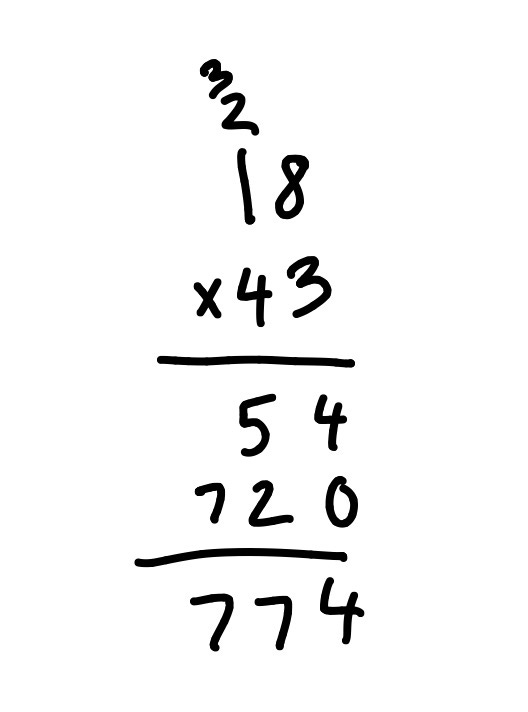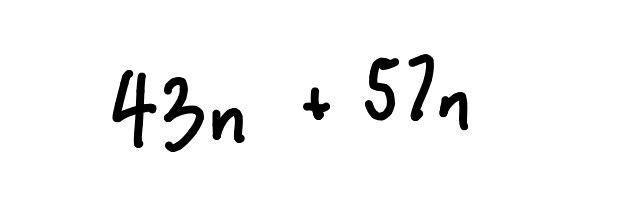
Challenging problems aren’t the ones that require a lot of labor. They are the ones that require thinking.
It is a huge mistake to focus on labor and think we’re doing such hard work. Maybe we’re actually being lazy by not coming up with a cleverer strategy for avoiding all that work.
We can use math as good metaphor to explain this idea. The brilliant Prealgebra book from The Art of Problem Solving teaches students to think algebraically — that is, strategically — about math, even when no variables are present.
For instance, the student may encounter a situation in which they are asked to simplify an expression like 18 x 43 + 18 x 57.
Many a student will dutifully stack 18 on top of 43 and execute the standard algorithm…
…And then do the same for 18 x 57.
I’m too lazy to do it for you, frankly. Because there’s a cleverer, quicker way.
We can remember that multiplication is simply repeated addition.
We can think of 18 as “n” and observe that we actually have:
Which means that we have 100 “n’s,” or 100n.
That’s 100 x 18, which is 1,800.
In effect, we’ve used the distributive property to solve it:
A problem that seemed kind of ugly and laborious is actually one we can solve in our heads if we think about it in a strategic way.
Good strategic thinking may look like laziness. The difference is in the outcome. Laziness has no positive outcome, but good strategic thinking does. When our thinking is on point, we can be efficient and effective: We do less work and take less time to achieve the desired result.
Too often, however, students and employees are trained to do extra for the sake of doing extra — to go above and beyond in order to show that they are someone who is willing to go above and beyond.
However, if there is no difference in the end result, we’ve just wasted a lot of time and effort. Not only that, we’ve strengthened the bad habit of believing that we’re “safe” if we’re doing hard work for its own sake. If you catch me with a broom and give me a nod of approval — even if the floor was already spotless when I started — I will learn that what matters is that I appear busy. As a bonus, if you praise me for trying, you avoid the uncomfortable experience of sharing feedback.
Our work can be more interesting than that if we’re willing to risk being wrong, weird, or temporarily overcomplicating things. We can reconsider the way we’ve always done something. We can reconsider whether the thing needs to be done at all. When we do, we might uncover elegant solutions to longstanding problems.
We don’t get more points when we cut vegetables with a dull knife. Carrying a bunch of random items isn’t more virtuous than using a bag. And we might as well use a formula to make calculations on a spreadsheet instead of doing it manually. And while these examples may seem silly, I’m constantly observing examples of how people (including me) keep similarly mundane things difficult to prevent themselves from having to face a deeper, more meaningful layer of work.
Keeping ourselves busy means we can delay confronting the big issues in our lives. But those very issues provide our greatest opportunities for growth. Questioning the status quo and revisiting assumptions can lead to unexpected and satisfying solutions — and give us more time and energy to tackle the next intriguing problem.
Or we can just kick back and be lazy for real. We’ve probably earned it!








We don’t get more points when we cut vegetables with a dull knife.”
Being strategic means doing more work!😜 It can feel good to be busy and that’s sometimes difficult to let go of, honestly. It’s important to remember that taking a step back and evaluating what the situation is before taking action may actually be more effective. This is a lesson I struggle with, particularly when I’m learning something new. It’s like I forget that it’s possible to apply skills that I’ve learned in other processes to this new thing I want to understand. The hard way doesn’t have to be the path we choose! Thank you for saying so.